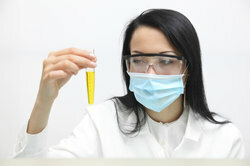Protein in the urine and diet
It is not necessarily uncommon for protein to be found in the urine. Bad diet can certainly be to blame for this. But you can prevent this.

What you need:
- Family doctor
- Nutritional advice
Where the protein in the urine comes from
If your diet consists of too much protein-rich foods, you can put protein in the urine receive.
- If there is protein in the urine, experts speak of proteinuria. The kidneys produce urine. To understand why proteins get into the urine, one has to know that the kidney is divided into three areas. These are: renal cortex, renal medulla and renal pelvis.
- The kidney cortex is, so to speak, the filter of the kidneys. In technical jargon, these are also called nephrons. You have around 1.4 million filters in each kidney, which among other things consist of kidney tubules and corpuscles. If you look at the kidney corpuscles, you can see a tangle of blood vessels. These walls of the ball are surrounded by a capsule and work much like a sieve. Among other things, salts, water and urea are permeable. When blood flows through it, substances can be pressed out of the blood vessel with water and land in the kidney tubules. The result is a liquid called primary urine in technical jargon.
- Anatomically, these canals now merge into "collecting tubes". These are located in the kidney medulla. This marrow looks pyramidal. The tip of the renal medulla is attached to so-called kidney calyxes. These calyxes receive the previous urine. Now it can be forwarded to the renal pelvis and the urine continues through the kidneys into the ureters.
- With this complex path, proteins can repeatedly be absorbed into the urine. But that in itself does not mean that you have kidney disease, for example.
Especially with bodybuilders or sports enthusiasts, pure protein is in addition to ...
With the right diet, you can influence your protein intake yourself.
This is how it works with the right diet
- Sometimes it happens that way too many proteins get into the urine. If this does not happen regularly, however, experts speak of what is known as benign reversible proteinuria. This then disappears again. Too much protein in the urine may be because you have probably ingested too much protein. Do you eat a lot of meat? Diet is one of the main priorities when there is too much protein in the urine.
- In any case, you can assume that too much protein in the urine is stressful for the kidneys. If your diet is high in protein, the kidneys will eventually no longer be able to metabolize the way they should. Because you have to know that all breakdown products (including too many proteins in the urine) are excreted through the kidneys. At some point the kidneys are overwhelmed.
- If you eat a lot of meat, there is a lot of animal protein in it. If you do not stop eating protein-rich foods or if you do not reduce them, you can definitely get gout.
- How about vegetable proteins? These do not contain any accompanying substances such as animal proteins. You also get a lot of fiber delivered.
- The best way to proceed is as follows: You shouldn't eat sausage every day, and if so, only thin slices (no more than thirty grams per serving). Also eat a maximum of 120 grams of meat per week.
- Eat the good vegetable sources of protein such as lentils, peas, and beans. Buttermilk and other dairy products are also very healthy. You can of course combine everything well with each other: buttermilk with muesli or potatoes with quark. It doesn't always have to be meat.
Give your kidneys a little break every now and then so that too much protein doesn't build up in the urine.
How helpful do you find this article?
The content of the pages of www.helpster.de was created with the greatest care and to the best of our knowledge and belief. However, no guarantee can be given for the correctness and completeness. For this reason, any liability for possible damage in connection with the use of the information offered is excluded. Information and articles must under no circumstances be viewed as a substitute for professional advice and / or treatment by trained and recognized doctors. The content of www.helpster.de cannot and must not be used to make independent diagnoses or to start treatments.

